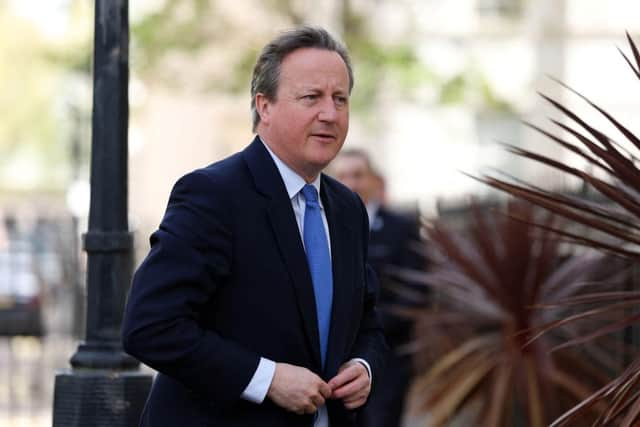Israel: David Cameron arrives for talks over Iran with Benjamin Netanyahu
Foreign secretary Lord David Cameron has warned that Israel is “making a decision to act” in its conflict with Iran as he landed in the country to hold talks with the country’s leaders in a bid to de-escalate the situation.
The foreign secretary was expected to meet with Israeli Prime Minister Benjamin Netanyahu and other senior figures to discuss their response to the drone and missile barrage launched by Tehran on Saturday night.
Advertisement
Hide AdAdvertisement
Hide AdSpeaking after arriving in Israel, Lord Cameron branded Iran’s attack “appalling”, but said he hoped Israel’s response would not escalate tensions further.


He said: “It's right to have made our views clear about what should happen next, but it's clear the Israelis are making a decision to act. We hope they do so in a way that does as little to escalate this as possible. And in a way that, as I said yesterday, is smart as well as tough.
“But the real need is to refocus back on Hamas, back on the hostages, back on getting the aid in, back on getting a pause in the conflict in Gaza.”
World leaders have called for a measured response to the crisis, which began after Israel carried out an attack on an Iranian consulate in Syria on April 1, killing seven Islamic Revolutionary Guards.
Iran’s response, to send hundreds of drones and missiles into Israel, the majority of which were intercepted, was the first time a direct military attack had been launched by Tehran on Israel despite enmity dating back to the country’s 1979 Islamic Revolution.
The visit comes a day after Prime Minister Rishi Sunak spoke to Mr Netanyahu on the phone, calling for “calm heads” in a bid to prevent escalation of the crisis.
He said: “Further significant escalation will only deepen instability in the region. This is a moment for calm heads to prevail.”
Advertisement
Hide AdAdvertisement
Hide AdLord Cameron has also spoken with his counterparts in Lebanon and the United Arab Emirates as part of efforts to reduce tensions in the region.
Iran’s president has separately warned the “tiniest invasion” by Israel would bring a “massive and harsh” response, as the region braces for potential Israeli retaliation.
President Ebrahim Raisi spoke at an annual army parade on Wednesday that had been relocated to a barracks north of Tehran from its usual venue on a major road in the city’s southern outskirts.
Iranian authorities gave no explanation for its relocation, and state television did not broadcast it live, as it has in previous years.
Israel, with help from the United States, the United Kingdom, neighbouring Jordan and other nations, had successfully intercepted nearly all the missiles and drones launched by Iran.
Tensions in the region have increased since the start of the latest Israel-Hamas war on October 7, when Hamas and Islamic Jihad, two militant groups backed by Iran, carried out a cross-border attack that killed 1,200 people in Israel and kidnapped 250 others.
Israel responded with an offensive in Gaza that has caused widespread devastation and killed more than 33,800 people.
Comments
Want to join the conversation? Please or to comment on this article.
